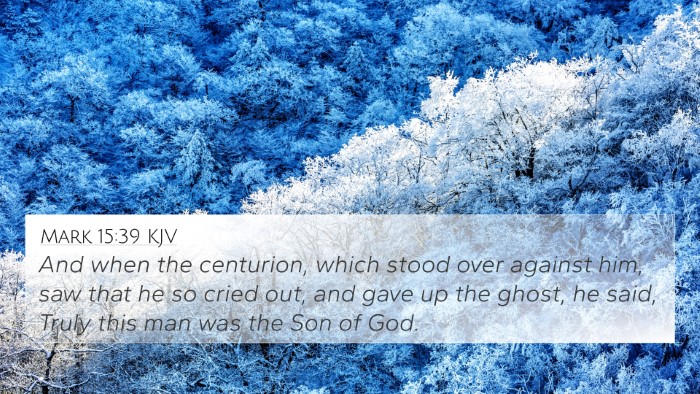The Meaning of Matthew 8:5
Matthew 8:5 states: "When Jesus had entered Capernaum, a centurion came to him, asking for help." This verse introduces an encounter that showcases the power of faith and Jesus' compassion.
Summary of Insights
The verse sets the stage for a remarkable miracle characterized by the centurion's humble approach and profound faith. The public domain commentaries provide various insights into this profound moment in the ministry of Jesus as recorded in the Gospel of Matthew.
Matthew Henry's Commentary Insights
-
Importance of Location: Henry emphasizes Capernaum’s significance as a base for Jesus' ministry. It symbolizes where Jesus revealed His divine authority.
-
Role of the Centurion: The centurion represents a Gentile, highlighting the opening of God's grace to all nations. His social status contrasts with the humility he displays.
-
Asking for Help: The centurion's request illustrates the theme of desperation leading to faith in Jesus’ ability to heal, reinforcing the biblical principle that faith moves one to seek divine intervention.
Albert Barnes' Commentary Insights
-
Symbol of Authority: Barnes points out that the centurion had authority over soldiers yet recognized Jesus’ authority over illness, demonstrating a profound understanding of divine power.
-
Contrast in Faith: The centurion's faith is praised, contrasting with the lack of faith often found among the Jews, which emphasizes the universal nature of faith.
-
Model of Intercession: This event serves as an illustration of intercessory prayer, where one man appeals for another's well-being, emphasizing community and care.
Adam Clarke's Commentary Insights
-
The Centurion's Faith: Clarke discusses how the centurion believed that Jesus could heal from a distance, which signifies a remarkable level of faith, recognizing Jesus' omnipresent authority.
-
Gentile Belief: Clarke highlights that the centurion's faith is a precursor to the inclusion of Gentiles in the fold of believers, showcasing early hints of the Gospel’s reach beyond the Jewish community.
-
Response to Jesus: The centurion didn't consider himself worthy to approach Jesus directly, portraying his humility and reverence toward Jesus’ divine nature.
Related Bible Cross-References
The themes and elements presented in Matthew 8:5 resonate with various other biblical verses. Here are key cross-references related to the themes of faith, authority, and divine compassion:
- Luke 7:1-10 - A parallel account of the centurion's request, providing further insight into his faith.
- Matthew 15:21-28 - The story of the Canaanite woman's faith demonstrates similar themes of Gentile belief.
- John 4:46-54 - The healing of the royal official's son also highlights faith in Jesus' word.
- Hebrews 11:1 - Defines faith as assurance of things hoped for, echoing the centurion's unwavering trust.
- 1 Peter 5:5 - Discusses humility before God, reflecting the centurion's attitude toward Jesus.
- Matthew 8:13 - Jesus' affirmation of the centurion’s faith and the healing of his servant serve as a direct continuation of this narrative.
- Acts 10:1-4 - Coordinates with the theme of a Gentile’s faith being recognized by God.
- Romans 10:12-13 - Affirmation that there is no distinction between Jew and Gentile in faith.
- James 5:16 - The power in faith and prayer, similar to the intercession of the centurion.
- Matthew 9:2 - Another story depicting faith through a request for healing, showcasing Jesus’ authority to forgive and heal.
Conclusion
Matthew 8:5 opens a window to understanding the breadth of Jesus’ ministry, encompassing elements of faith, authority, and the inclusivity of God's grace. Through careful comparative Bible verse analysis and scriptural cross-referencing, we see the interwoven nature of the biblical narrative, calling believers to discern and recognize the common threads connecting the Old and New Testaments.
















